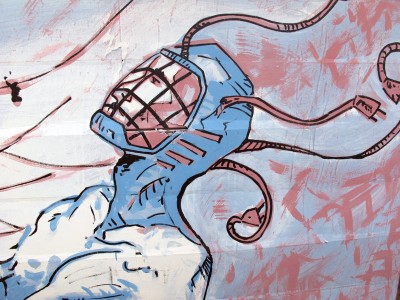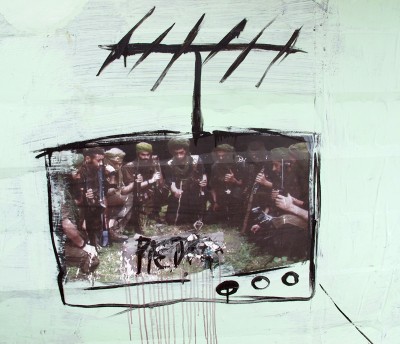THE CHARGE IN THE GLOBAL MEMBRANE: NOTES ON PARADIGM CHANGE By B.W. Powe
Prose Percepts, Lyric Responses by B.W. Powe, in collaboration with Marshall Soules, on NEW MEDIA, EMPATHY, IDENTITY, REFUGEES, NATIONALISM, THE DONALD TRUMP PHENOMENON, JUSTIN TRUDEAU, A-LITERACY, THE WILD INTERNET, PARANOIA, POETRY AND INTIMACY, BOB DYLAN, PATTI SMITH…
Street Art Photos by Marshall Soules
We´re experiencing the charge in the global membrane… By this I mean immersion in our electrified technological environment. All the puns in charge implied. Marshall McLuhan was one of the first to recognize we´re wired up, transformed, wholly inside borderless, transnational, instantaneous, entangling, speeding, here-there-everywhere-now states, in an always intensifying mutable milieu.
The global village became the global theatre: the theatre has become the global membrane. This phrase adapts what Teilhard de Chardin called “the noosphere,” the subliminal layering of externalized thought and emotions around our planet, in our era of apogees and abysses. The charge is the recognition of the second creation, the second Big Bang: the experience of technological expansion through electrification and the resulting accelerating streams and pulses of data-energy.
Antenna Head, Havana, 2016
The membrane is the communications’ envelope, the atmosphere of circuiting messages and vibrations. The global membrane brings at once an Opening Time and a Closing Time.
The Donald Trump phenomenon is in part a reaction against the charge of the global membrane. One of its wounds is a loss of a sense of identity. All becomes amorphous when borders are fluid and homelands become unsettled or dangerous places. When identity is threatened and bruised, violent behavior and desperate responses can follow. In the refugee migrations we see people fleeing, driven to find new identities, escaping from places in vicious convulsion. They´re turning from their heartbreak, impelled to seek paths they hope lead to an opening in a new heartland. These are forced pilgrimages born out of radical political instabilities. But the refugees often find barbed wire barriers and the cry for increased border protections. This is the voice of the closing: separatist movements, whether based on ethnicity or economic concerns, are about walling out the global surges of sensational change. Sometimes nationalist movements claim they want to rearrange trade deals, but this often cloaks an anxious urge towards insularity and grievance with the Other (someone else is to blame for the challenges of being here, in the global intricacies), a distinct status for people who regard their conditions as exceptional, under threat, besieged by waves of transformations (cultural, financial) that can´t, apparently, be shaped except by closing borders or establishing isolate regimes.
Expressions of nationalism are about preserving old identities and shutting down borderlines in a world that is jump-starting towards open communions of the soul. By which I mean solidarity with the experience of exile, abandonment, humiliation, and suffering; the common yearning for justice and generosity; our deep need to participate in abundance, to spread the wealth; our desire to break free from loneliness and perpetual fatigue; our sense that we´re at our best when we participate in the spirit of trust, compassion, welcome, and love. Because unstoppable information surges and blurts, in unbridled intensities, fear and anger arise: …who´s listening in? …who is in control? …who is the enemy? …who´s infiltrating our “values?” …these are some of the sensationalized responses to being wired into breaking immediacies.
Disconnected, Havana, 2016
Refugees move across the globe bringing a suffering so intense that they will move us with their pulses of grief. Injured souls tend to want to flee or withdraw. And the brutalization that comes from unlimited data, sensory input, can create “hard feelings”: thus the shouting out for tough action. The global membrane is more about ripples of sensibility than it is about ideologically determined positions. It initiates a conflict between openness, receptivity, forbearance, generosity, patience, and empathy, and set reactions, suspicion, judgment, anxiety, and intolerance.
Capoeira in the City, Havana, 2016
Trump’s call to “Make America Great Again” is a raging tough-line retrieval action for something that never truly existed. All identities are provisional. “How very one minute ago,” the saying goes… Meaning: the speed-effect ushers in crises of self-hood, unending feelings of displacement. Crucially, Trump uses media in an unprecedented way. We see this when we understand how he’s tuned into a-literacy, digital experience, the waves of sensation and impression, the currents of now that provoke trauma and paroxysms of reaction. Hillary Clinton, a private person, a policy wonk, aka a literate person, couldn’t counter the intuitive magic of one so connected to the a-literate waves of hearsay, “post-facts,” tweet-storming, conspiracy theories, public rambles that become abusive stand-up routines, sudden inexplicable flips in positions and stances, and show-biz. Extension, association: illiteracy means a person can’t read an alphabetic text; post-literacy means a person nostalgically recalls the act of reading a book or a printed page; a-literacy means a person has no interest at all in reading.
Block Head and Funnel, Havana, 2016
Former President Obama showed that he could speak to both the waves of emotion and to the intellect during his two election campaigns. And Michelle Obama can also do so now–she should run in the next American federal election: she’d likely soundly defeat Trump. During the 2016 campaign, Trump was “out of his mind” (great copy), the reckless outsider who relished audience (public and virtual) responses to evermore spectacular, extremist claims. Hillary Clinton seemed at times to embody common sense and the insider´s view: too cautious and careful for the prickling of incessant stimulation; secretive, because uncomfortable in the spotlight, therefore a person “under suspicion.” Any identification of a middle way will likely be unpopular when the pull of extremism takes hold.
Giving Voice (Julier), Havana. 2016
The fierce debates in the media about Trump manifest a civil war of sensory bias. The print media is ganging up on the electronic media. Print media demand historical verifications (fact checks), research confirmations, descriptive consistency, and cultural memory. Newspapers and journals thrive on steady editorial points of view. The electronic media thrive on orality, rumor, reverberations, echoes, icon and image, quick access at your finger-tips (being in touch), headline prompts, confrontational blogs, and avatar (or troll) identities: the speeding cubist expression of an everything-at-once experience. Print works on lag-time, gradually catching up to events. Contexts and situations are shifting so fast that no essaying can truly keep track. Images are instantaneous X-rays which enhance both scrutiny and blurring. Blurbs can be memorable and transient. Print may allow for contemplative attention and concentrated analyses: you need time and space (privacy) to read. E-connectivity grows with snapshots (Instagramming) that simultaneously encourage snap protests, spontaneous flash-risings that strike back at the hunger for authoritarianism that is rapidly re-appearing in North America, South America (Venezuela), and Europe (especially in Hungary and Poland). The ideal for the sensorium is a gestalt of print and e-media, in a fearful symmetry.
City on My Mind, Havana, 2016
Justin Trudeau is the positive mirror image of the dark negating Trump. Justin uses the electronic media effectively, too. We can see how intertwined he is with net sensation when he strays from prepared speeches: he’s often incoherent (lots of “ums” and “uhs”). He massages the media to encourage us with “sunny ways”–-lightness; when he falters, the lightness becomes shallow. He has charm (magic): beyond ideological, he nevertheless tries to steer a wary way through the middle of our global epic of extremism. It remains to be seen whether either the Conservatives or the NDP in Canada will be able to counter his authentic hopeful tone: and whether his photo-op charisma will be enough to counter Trump´s unhinged corporatism and contempt for letters. Justin’s charisma differs from that of his father, Pierre Elliott Trudeau. He was a literary person, a private sensibility with considerable gravitas, who nevertheless could, paradoxically, flippantly play with what was the new media then. Trudeau Sr. opposed militant nationalism in all its guises. Would such a politician be electable in our entrancing, inter-connective, anxious, shimmering, supra-attentive atmosphere?
Advice to readers (a pause for a thought). People are told not to post long, complex writings on the net because no one will read them. Attention spans are drawn to the brief interval, the turn to screen magnetism, its ionic agitations. ADD has become a natural state of reception. Nevertheless, let´s go on:
Conspiracy theories swarm in the gaps between the print medium and the electronica of sensation and over-heated, transforming story-head-lines. There is necessary fictionalizing in print and electronica: it´s necessary because we must tell stories. Still, descriptions that match facts are almost impossible outside of science and mathematics. Not even Quantum Mechanics, with its strange evocations of subatomic realities, truly has a language that can map what we can´t fully envision. Imagination and opinion must play a part: we´re always making. Now we´re making in conditions of I-cloud and access overdrive…
Terror TV, Havana, 2016
“Shifts Happen,” the wry graffiti announces. But what happens when a political leader insists that his take on things is the only “real” one? This is how a leader or a movement turns authoritarian. “I alone…” Trump repeatedly announced during his election campaign. “In the end you will thank me…” Trump said during the first months of his presidency after another magnetizing and demagnetizing act (the meaning of polarization). Remember Groucho Marx´s prophetic gloss: “Who are you going to believe–-me, or your own eyes?” Data bubbles insulate users, habituating them to closed circuits. This provokes hyper-states of awareness that ramp up assent and anxiety.
Cartoon-like conspiracy theories become frenzied when people think there´s a subterranean order lurking in the static, vibrations, dash, and blur, the immediate press of data. The visible is being shadowed by an order not apparent to everyone else. Vast networks sending-receiving information must traffic in weird, dangerous intentions (it seems). The gaps invite conspiracy theorizing, the mind operating “outside of itself.” This is pattern-recognition flipping into paranoia. Some claim they have special second-sight (insight, foresight)–-an occult seeing into the gaps of static where things seem hidden. Sleeplessness and panic, bombast and insensitivity, incite internet alternative worlds, in which destabilizing threats and accusations run rampant. Philip K. Dick´s sci-fi visions now seem routine. Democracies become deeply vulnerable in the skittish conditions. People feel harassed and battered. Who’ll stop the reign of speed? The faster things go the more events and ideas flip into caricatures. Those who make alarming twitter claims often see themselves as searing leaders of mass movements, welcoming the formation of cult-like followers and rallies.
Seers and Followers, Havana, 2016
Everyone feels the static cling and so we become “touchy.” Tempers flare, grievances spill over, nerve-ends jump, emotions frazzle; positions become inflexible, crudity and cynicism become habitual; debates turn unforgiving and accusatory. The pulsations of the membrane amplify irritabilities but also the desire for easing and peace. Notice the proliferation of yoga studios in cities and towns, places where people stretch out their bodies to calm down. “Show your heart,” yogis say. A planet of excited messaging concentrates billions of eyes and ears, scoping, scanning, listening in, eaves-dropping. “Don’t become de-sensitized…,” editorialists and reporters say. It’s an apt warning, after the global village and global theatre were subsumed into the vibrant membrane.
In this sense-surround, empathy and impressionability must stay alive by listening to differing voices, by cultivating spaces of inwardness and contemplation, by finding time for reflection and intuition, by practicing restful periods, by dialing down the noise, by piecing together the news from many sources, by a healthy dissent to counter the unfettered cravings and nihilistic lies of many leaders, by developing the skill to recognize patterns with compassion and good will, by meeting people directly who are suffering (being at the side of the Other). We´ll know truth by comparing fictions. This helps to slow down the pulse rate in our jittery fervors and soul exposures.
Social Networking, Havana, 2016
And if you’re still reading this:
Note how many literary people opt out of the wired wireless, avant-garde spectacle–-Alice Munro, Don DeLillo, Thomas Pynchon, Cormac McCarthy, Anne Carson, Marie-Claire Blais, Marilynne Robinson–sometimes eluding, if not trying to evade, the effects of Big Media. Ironically, this becomes a media tale, too. Pynchon’s refusal to be photographed is legendary. Munro and McCarthy give rare, prized interviews that reveal almost nothing about themselves or their craft. This is solitude’s rebellion against noise, mobbing data. Writers turn to the margins, going underground, where they can work slowly, preserving their sense and sensibility. Privacy has come to mean turning within, becoming inward. Authors often seem to call out for quiet, stillness, meditative time, sustained attentiveness to the beautiful ambiguities of words and the shapes of sentences, so we can concentrate and listen to the elusive spirit on the page. The literary space becomes smaller and smaller: observe the obsession in contemporary fiction with rooms, little towns, interior monologues, family breakdowns, individual hurts and crack-ups, trekking alone through a wilderness. But this is, quixotically and paradoxically, a privacy that hides in the open: the margins are a vulnerable place in the intimate throb of our cellular conditions.
Dreaming of Home, Havana, 2016
The doors of perception have been ripped off their hinges in our data-ion saturations. Meaning: we´re not standing on one side of the door or the other: all is hum, hack, flicker, tweet, leak, skype, livestream, buzz and feed; all is permeating turbulence, engulfment of the senses–a dynamo that generates ecstasy and a shrinking (or shuddering) from the impact.
Our immersion in the global systole and diastole is a universal experience–not happening to you or me, to us or them, but wholly to we. Moments of receptivity and grace; and linked impulses that can lead to shut-down. We may say, “It´s not clear enough” (bring on more transparency), and we may say, “It´s too much” (tilt). Selfies are like birth-certificate and passport images in the borderless-ness of the membrane. They confirm we exist–we´re in a digital archive–living now here and there (nowhere and everywhere). IMs… This is what techies call Instagram Messaging. A translation of that acronym: I am plural; I am multitudes. Each person is a mediator of the one and the many; each of us a part of the beat and the chorus, both a wave and field.
Bob Dylan, Leonard Cohen and Patti Smith are cusp figures: in the inter-phase of book culture and electronic musical reach, adeptly moving between communicating domains, songs and poetry. Dylan´s interviews can be put-ons of insolent eloquence; they´re often rich with storytelling and gracious tributes to fellow musicians. Chronicles Volume 1 is an indispensable work that reveals how attuned Dylan is to environments (attentive to influence). It also shows how masked a personality he is; he gives little away about his soul´s state. Will there be a Volume 2? Maybe. Maybe not. Evasion and ambiguity are his ways of staying alive artistically. Cohen over the years cultivated a courtly, often priestly public persona that shrouded his practiced ironies and his obsession with slippery sex. Beautiful Losers, his best book, moves into hallucinatory, shape-shifting spheres. Chants, omens, rituals, orgasms and longings haunt the shadowy speaker in this prose poem. It remains a hermetic work of holy aspirations and erotic visions, with its roots in the Book of Ezekiel and Henry Miller´s Tropic of Cancer. Depths require patient exegesis. Curiously, Patti Smith rarely mentions music in her meditative book, M Train. She mostly cites novelists and poets; and she makes detailed references to detective shows (about private eyes) on TV. Nevertheless, her contemplation exalts a reverent personal space. It’s an elegy for the passing of the people she loves and a reverie-like contemplation of stillness and silence. Her tone in M Train is steeped in mourning and loss, a sense of the dearness of things.
Water Everywhere…(Julier), Havana, 2016
Dylan, Cohen, and Patti Smith began their work in the thrall of the teenage visionary iconoclast Arthur Rimbaud. They shared the early intuition that his alphabet of the soul, the universal symbolic language, had arrived in the miraculous ability to commune 24-7-52-365 with everyone and all via the wirings of the global village. Van Morrison recognized this pressing of the charge when he sang, “It´s too late to stop now,” in his spiritual crisis song, “Into the Mystic.” We can also see now that Rimbaud´s prophetic demand that we live in continual crisis through “the deliberate derangement of the senses” is the new normal of the global membrane.
La Sirène Urbaine, Paris, 2016
These cusp-artists found ways to live long productive lives by conjuring and configuring the ripples and rush, the wild shifts and darkening divisions. We honor them by following up through our homages, our preservations of complexity and inwardness, our pursuits of wonder and awe, our Eros of creating, our enigmatic cultivation of beauty and spirit, our call and response to those (to all of us) who are also pilgrims and know wishing wells and heartbreak.
Pattern Recognition, Havana, 2016
It´s not our eyes that need to be wide awake all the time: it´s our souls. We can close our eyes but our souls will still hunger for insight and vision…
The global membrane can be a great heart, its effects like tides in our ears, felt on our skin. Simultaneously, its effects can be like noisy, invasive drives that incite a need to arrest and even kill its pull. Opening Time… Closing Time… Will one effect prevail over the other? I pray for the courageous heart. I hope for the language of the open communion.
Heart of the City, Havana, 2016
We´re turning and turning in this whorl, this planetary emergence: the time of the galvanized atmosphere of thought and feeling, the momentum and pressure of vast meaning.
Does it matter if any of us like these processes of transformation?
The evolutionary pulse beats on, in hyper-speed.
B.W.P. 2017
Filed under: Acoustic Space, Art, Commentary, Ideas, Internet, Media Ecology, New Media, Technology | 5 Comments
Tags: art, communication, culture, global village, ideas, Internet, media, technology















Might not be heralding the “Second Coming”, but certainly illustrating that “the center cannot hold.” Or, at least, the center shifts or multiplies. Angela Merkel might be alluding to this.
LikeLike
Dear Aneeshka Vyas at Excalibur Publications: Please be advised that I have approved your link in your article about my good friend and colleague B.W. Powe’s “The Charge in the Global Village” to my McLuhan Galaxy blog where it is published online. However, you erroneously state that the McLuhan Galaxy blog belongs to B.W. Powe, which it does not. The blog is owned and published by me, Dr. Alexander Kuskis, and has been since I started it in 2017. I would appreciate it if you would correct the error. Thank you.
LikeLike